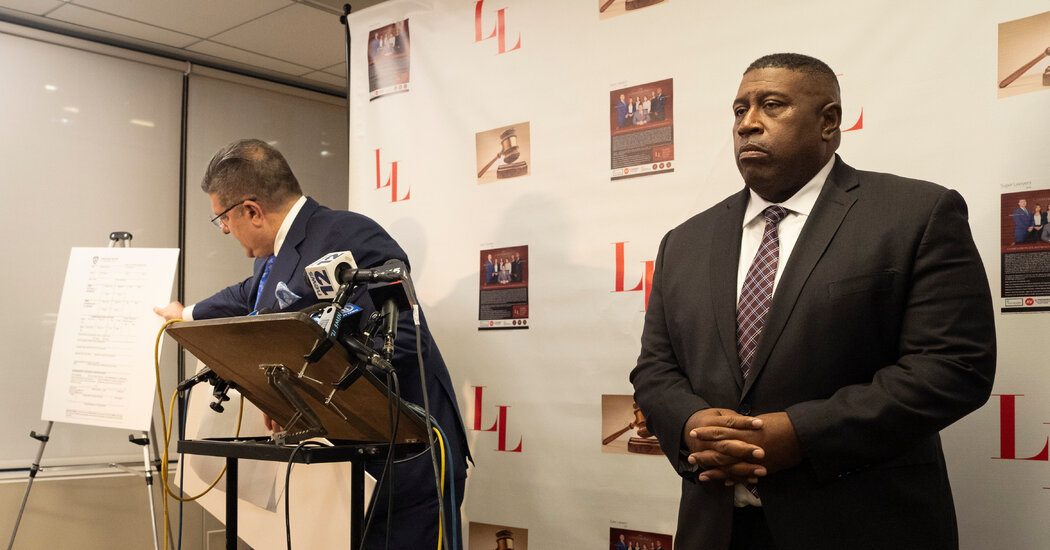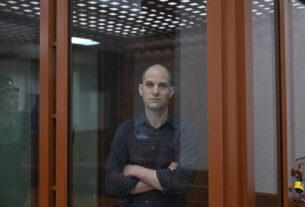Over the years, Jeffrey B. Maddrey toiled as a beat cop in half a dozen Brooklyn precincts. He nurtured hundreds of officers he oversaw as an inspector. He quelled violent crime in a dangerous part of Brownsville.
But not until he shepherded officers through the pain and anger of seeing one of their own shot dead in 2011 did he attain the high profile that would later undo him.
After the officer, Peter Figoski, was killed while trying to stop a robbery, Mr. Maddrey became the face of law enforcement in the 75th Precinct. He spoke to reporters about the murder and led a weeklong search for the fatal bullet. At the funeral on Long Island, he handed the Figoski family a folded American flag.
Mr. Maddrey “has certainly been in our sights for a while as someone deserving of recognition,” said then-Commissioner Raymond Kelly at a ceremony in which he posthumously promoted Officer Figoski to detective and elevated Mr. Maddrey to deputy chief.
The base of support Mr. Maddrey built in those years with Brooklyn pastors, rabbis, anti-violence groups and politicians — including, crucially, Eric Adams, a former police captain who would become mayor — vaulted him to the highest uniformed rank of the nation’s largest police department. It insulated him during a string of scandals — until the one that ended his career.
In December, a lieutenant and former subordinate, Quathisha Epps, accused Mr. Maddrey of demanding sex in exchange for hundreds of thousands of dollars in overtime. Mr. Maddrey, who was chief of department, resigned. Federal agents have searched his home, and the department’s Internal Affairs Bureau has launched its own investigation.
Mr. Adams, who is facing federal corruption charges, has defended how he had pushed Mr. Maddrey to the upper echelons of the Police Department.
In an interview last week with Corey Pegues, a retired deputy inspector and host of a YouTube channel, Mr. Adams said Mr. Maddrey “was beloved in Brooklyn North,” Mr. Adams said, referring to the territory that Mr. Maddrey once oversaw.
Mr. Pegues said Mr. Maddrey had weathered repeated scandals with few repercussions. “You gave him that second or third chance,” Mr. Pegues said. “How many chances do you give him?” Mr. Adams said, “People gave me 10 chances.”
“I needed someone with that police experience and great interaction” with the public, Mr. Adams said. “He went beyond the call of duty.”
The mayor’s relationship with Mr. Maddrey dates back at least two decades.
In 2006, the year Mr. Maddrey was promoted to deputy inspector, Mr. Adams was elected to represent a Brooklyn district in the New York State Senate. Both Mr. Maddrey and Mr. Adams spoke at community board meetings, and they were invited to talk with students in Bedford-Stuyvesant about policing.
In 2015, a year after Mr. Adams became Brooklyn borough president, Mr. Maddrey was chosen to lead the 10 precincts that compose Patrol Borough Brooklyn North, another major career leap. The two went to an awards banquet for the Mo Better Jaguars youth football team; a school gymnasium where students played double Dutch; and an event in Bushwick to improve police relations.
By then, Mr. Maddrey had long been a large presence in the borough, said the Rev. Robert Waterman, a pastor at Antioch Baptist Church in Brooklyn who has known Mr. Maddrey for more than two decades.
Mr. Waterman said they met when Mr. Maddrey, then an inspector in the 81st Precinct, had invited him to talk with veteran officers and recruits about concerns over neighborhood policing. He said Mr. Maddrey took children to special events and suited up as Santa Claus for Christmas.
“I had never known him to be anything but an officer who had not only walked the beat, but was part of the beat of the neighborhood,” he said.
Mr. Maddrey first became fodder for the city’s tabloids in 1993. Then a rookie, he was leaving a woman’s apartment building in Staten Island when two men approached him, including the woman’s suitor. The suitor’s friend fired several shots, striking Mr. Maddrey in the left wrist.
But his real troubles began in 2016, a year after he had been promoted to assistant chief and the head of Brooklyn North. They arrived in the form of a lawsuit: A subordinate with whom he was having an affair accused him of beating her, prompting her to pull out a gun, according to court filings. Mr. Maddrey, she said, tore it away. The suits were tossed out, but James O’Neill, then commissioner, docked Mr. Maddrey 45 vacation days.
Nonetheless, in 2020 Mr. Maddrey was made head of the Community Affairs Bureau, which educates New Yorkers about policing and crime prevention. The appointment set the stage for his push to the top after Mr. Adams was elected the next year.
The new mayor, who continued to identify himself closely with the department and took a strong hand in its affairs, supported a quick succession of high-level promotions for Mr. Maddrey. He became chief of housing, then chief of patrol and, by the end of 2022, chief of department — the person who oversees operations, crime-fighting strategies, quality of life initiatives and all of the agency’s 33,500 officers.
Even after that, problems emerged. Mr. Maddrey faced disciplinary charges from an oversight board in 2023 for voiding the arrest of a retired officer accused of brandishing a gun at three boys in Brooklyn.
Keechant Sewell, then the police commissioner, agreed with the board. But that June, she resigned after months of talk that allies of Mr. Adams had been undermining her.
Her Adams-appointed successor, Edward A. Caban, dismissed the case against Mr. Maddrey. In the interview with Mr. Pegues, Mr. Adams denied exerting pressure on Ms. Sewell or Mr. Caban.
Then there were the lawsuits. Cases filed in the past two years claim that Mr. Maddrey had an officer in the traffic unit transferred after he issued Mr. Maddrey’s female friend a ticket; that he protected a former officer and senior adviser to Mr. Adams who was accused of sexual harassment; and that he defamed an anti-violence activist.
Christopher Mercado, an adjunct assistant professor at John Jay College of Criminal Justice and a retired Police Department lieutenant, said none of the disciplinary or legal accusations were enough to hinder Mr. Maddrey’s career.
“He’s friendly. He shakes everyone’s hand. He comes in the room and fills the room,” said Mr. Mercado, who has attended events with Mr. Maddrey. “He came up at a time when there were few African American executives at the department, and the community adored him.”
And, Mr. Mercado said, even as Mr. Maddrey’s personal problems intensified, he tackled policing problems aggressively, impressing executives.
“They’ll say: ‘Oh, they grinded it out. They handed that shooting well. They were there at that riot. They protected their cops,’” Mr. Mercado said.
“If you’re a guy like Maddrey, and you’re willing to do all of that, even if you have had issues in the past, people at the top might look the other way,” he added.
Looking away became impossible last month.
Lieutenant Epps, a single mother of three children, told the federal Equal Employment Opportunity Commission that Mr. Maddrey had humiliated her during unwanted sexual encounters, many at his office at police headquarters in Manhattan. In an interview with the New York Post, she said that, on one occasion, she pleaded with him to stop, crying out, “You’re hurting me.”
During the 2024 fiscal year, Lieutenant Epps had made $204,453.48 in overtime, roughly doubling her salary while working under Mr. Maddrey — the most of any department employee.
She and Mr. Maddrey were both suspended amid the federal investigation.
Mr. Maddrey’s lawyer, Lambros Lambrou, did not respond to requests to interview the former officer. But in an interview last month on NBC New York, Mr. Maddrey denied demanding sex in exchange for overtime pay. He said his relationship with Lieutenant Epps was a consensual “office fling.”
Mr. Maddrey then recited the high points of his career, talking about his relationships with people in Brooklyn and how crime overall fell while he was chief of department.
“I’ve given so much to the city — so much — and I’ve never asked anyone for anything in return,” he said. “Countless people can never repay me for what I’ve done for them.”
Mr. Adams is no longer in a position to repay him: Mr. Caban, who is being investigated by the F.B.I., resigned in September, and two weeks later, Mr. Adams was federally indicted on corruption charges. Last month, he appointed Jessica Tisch as commissioner. She has already reassigned many officers and several top police officials, including at least one allied with the mayor.
Mr. Adams has distanced himself from Mr. Maddrey. “I’ve never defended any accusation of any inappropriate behavior,” the mayor said in an interview last month with Fox 5 New York.
“He has had an exceptional police record,” he added. “Those are the knowns. I cannot defend or speak on the unknowns.”
In October, Mr. Maddrey spoke at Linwood Street and Sutter Avenue, a corner the city had renamed in honor of the officer who was shot there.
“What Pete Figoski did for this community should always be recognized,” Mr. Maddrey said, tapping the lectern for emphasis and pointing to a new street sign bearing Detective Figoski’s name.
Mr. Maddrey was met with a round of applause. Two months later, he resigned.





